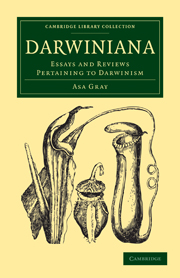Book contents
- Frontmatter
- PREFACE
- Contents
- ARTICLE I THE ORIGIN OF SPECIES BY MEANS OF NATURAL SELECTION
- ARTICLE II DESIGN versus NECESSITY—A DISCUSSION
- ARTICLE III NATURAL SELECTION NOT INCONSISTENT WITH NATURAL THEOLOGY
- ARTICLE IV SPECIES AS TO VARIATION, GEOGRAPHICAL DISTRIBUTION, AND SUCCESSION
- ARTICLE V SEQUOIA AND ITS HISTORY: THE RELATIONS OF NORTH AMERICAN TO NORTH-EASTERN ASIAN AND TO TERTIARY VEGETATION
- ARTICLE VI THE ATTITUDE OF WORKING NATURALISTS TOWARD DARWINISM
- ARTICLE VII EVOLUTION AND THEOLOGY
- ARTICLE VIII “WHAT IS DARWINISM?”
- ARTICLE IX CHARLES DARWIN: SKETCH ACCOMPANYING A PORTRAIT IN “NATURE”
- ARTICLE X INSECTIVOROUS PLANTS
- ARTICLE XI INSECTIVOROUS AND CLIMBING PLANTS
- ARTICLE XII DURATION AND ORIGINATION OF RACE AND SPECIES
- ARTICLE XIII EVOLUTIONARY TELEOLOGY
- INDEX
ARTICLE XI - INSECTIVOROUS AND CLIMBING PLANTS
Published online by Cambridge University Press: 05 October 2010
- Frontmatter
- PREFACE
- Contents
- ARTICLE I THE ORIGIN OF SPECIES BY MEANS OF NATURAL SELECTION
- ARTICLE II DESIGN versus NECESSITY—A DISCUSSION
- ARTICLE III NATURAL SELECTION NOT INCONSISTENT WITH NATURAL THEOLOGY
- ARTICLE IV SPECIES AS TO VARIATION, GEOGRAPHICAL DISTRIBUTION, AND SUCCESSION
- ARTICLE V SEQUOIA AND ITS HISTORY: THE RELATIONS OF NORTH AMERICAN TO NORTH-EASTERN ASIAN AND TO TERTIARY VEGETATION
- ARTICLE VI THE ATTITUDE OF WORKING NATURALISTS TOWARD DARWINISM
- ARTICLE VII EVOLUTION AND THEOLOGY
- ARTICLE VIII “WHAT IS DARWINISM?”
- ARTICLE IX CHARLES DARWIN: SKETCH ACCOMPANYING A PORTRAIT IN “NATURE”
- ARTICLE X INSECTIVOROUS PLANTS
- ARTICLE XI INSECTIVOROUS AND CLIMBING PLANTS
- ARTICLE XII DURATION AND ORIGINATION OF RACE AND SPECIES
- ARTICLE XIII EVOLUTIONARY TELEOLOGY
- INDEX
Summary
“Minerals grow; vegetables grow and live; animals grow, live, and feel;” this is the well-worn, not to say out-worn, diagnosis of the three kingdoms by Linnæus. It must be said of it that the agreement indicated in the first couplet is unreal, and that the distinction declared in the second is evanescent. Crystals do not grow at all in the sense that plants and animals grow. On the other hand, if a response to external impressions by special movements is evidence of feeling, vegetables share this endowment with animals; while, if conscious feeling is meant, this can be affirmed only of the higher animals. What appears to remain true is, that the difference is one of successive addition. That the increment in the organic world is of many steps; that in the long series no absolute lines separate, or have always separated, organisms which barely respond to impressions from those which more actively and variously respond, and even from those that consciously so respond—this, as we all know, is what the author of the works before us has undertaken to demonstrate. Without reference here either to that part of the series with which man is connected, and in some sense or other forms a part of, or to that lower limbo where the two organic kingdoms apparently merge—or whence, in evolutionary phrase, they have emerged—Mr. Darwin, in the present volumes, directs our attention to the behavior of the highest plants alone.
- Type
- Chapter
- Information
- DarwinianaEssays and Reviews Pertaining to Darwinism, pp. 308 - 337Publisher: Cambridge University PressPrint publication year: 2009First published in: 1876



